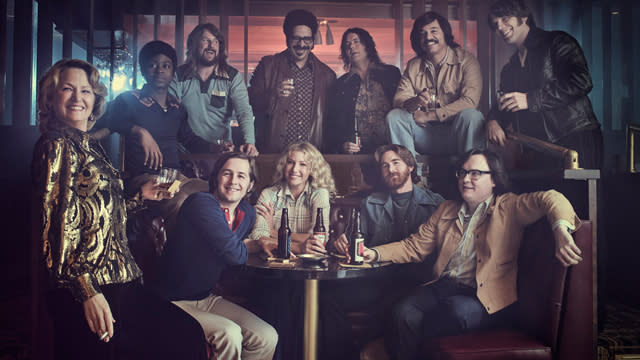‘I’m Dying Up Here’: Standup Comedy as Serious Business

Are there enough comedy nerds out there to give I’m Dying Up Here — a new series premiering on Showtime Sunday night — a substantial audience? The TV industry as a whole would seem to think so. Recent shows that use standup comedy as a backdrop include HBO’s Crashing (with comic Pete Holmes), Netflix’s Lady Dynamite (with comic Maria Bamford), TV Land’s The Jim Gaffigan Show, and the Amazon pilot from Amy Sherman-Palladino, The Marvelous Mrs. Maisel. Add the intense coverage of how comedians like Stephen Colbert and Jimmy Kimmel are offering opposing philosophies of what people now find funny, and the assumption seems to be that the public is interested in how the joke-sausage is made behind the scenes.
All that said, I’m Dying Up Here asks more of viewers than they may want to bear. The hourlong series — a drama with comic elements — takes place in the early 1970s, and is based on an interesting book of the same name written by William Knoedelseder about the comedy-club scene that helped nurture such stars as David Letterman, Robin Williams, and Andy Kaufman. Knoedelseder detailed a hothouse atmosphere centered around the Hollywood club the Comedy Store, run with tyrannical firmness by Mitzi Shore.
I’m Dying’s fictionalized comedy club is run by Melissa Leo as Goldie. Instead of actors portraying the real-life comics in Knoedelseder’s nonfiction work, we get a bunch of made-up comedians in this series, developed from the book by producer David Flebotte. They include Billy (Andrew Santino), a twerp with an outsize sense of entitlement who is supposed to pass as the show’s chief male protagonist; Cassie (Ari Graynor), a comic who owes her comic rhythm and body language to Elayne Boosler, who should sue; and Clark Duke and Michael Angarano as two young comics who’ve just arrived in L.A. from Boston and are meant to be our entrée into the comedy-club world.
All of these comedians, as well as a slew of supporting players (including the very funny Al Madrigal playing a not-so-funny comic who’s supposed to be a version of Freddie Prinze), grind through standup sets we endure along with the audience, who at least have alcoholic beverages at Goldie’s. To be fair, a lot of the material is right for the period and therefore not particularly funny to 2017 ears. But if I’m going to cut the show some slack for period accuracy in this area, I have to point out some howling time-period dialogue mistakes, such as: No one “went ballistic” in the early ’70s, nor did they ask, “What is your damage?” The evening in which anyone could get up and perform was an “open-mike night,” not, as we repeatedly see written here, “open-mic” — that irritatingly ungrammatical shortening of “microphone” would not become commonplace for another two decades.
Those are the least of I’m Dying’s problems, however. As drama, the show is inert. After watching four episodes, I realized I’d been watching constant variations of the same narrative arc: Comedian campaigns to get stage time at Goldie’s. Pause for subplots about other comics’ personal lives. Back to Goldie’s for a performance, during which the comedian either “kills” or bombs, after which he or she is just as miserable as when the episode began.
Then there’s the dialogue, which operates in two modes. The comedians talk to each other most often as though they’re constantly breaking in new material — it’s one punch line after another, and so little in the way of content or emotion is actually expressed. The other way characters address each other is to decline conversation entirely and make pretentious declarations instead: “Find a voice women can relate to … that sheds light on our mutual experience.” “It’s the current that moves through the audience when a truth is revealed.” The performers can’t breathe much life into hollow statements like that. Even a ventriloquist is pretentious here: “It’s society that throws its voice, through me!”
The ventriloquist, by the way, is subjected to the show’s particular scorn. Just once I’d like to see a vent portrayed in a TV show or movie as a well-adjusted, intelligent person rather than a neurotic idiot or misfit. And the fact that I’m whiling away minutes thinking about that suggests just how uninvolving I’m Dying Up Here is.
I’m Dying Up Here premieres June 4 at 10 p.m. on Showtime.
Read more from Yahoo TV:
RJ Cyler Explores the ’70s Roots of ‘I’m Dying Up Here’
‘Long Strange Trip’ Review: Is a Great Grateful Dead Documentary
Ariana Grande’s ‘One Love Manchester’ Benefit Concert to Air on Freeform, ABC
